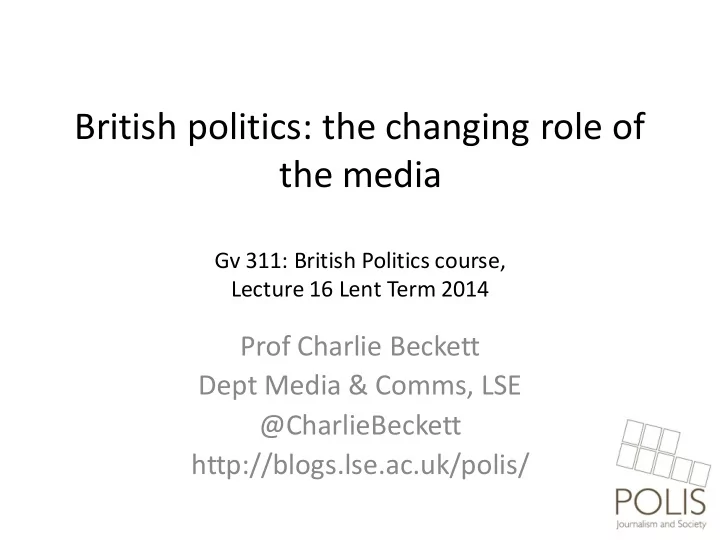

British politics: the changing role of the media Gv 311: British Politics course, Lecture 16 Lent Term 2014 Prof Charlie Beckett Dept Media & Comms, LSE @CharlieBeckett http://blogs.lse.ac.uk/polis/
Today’s lecture 1 How political journalism is becoming networked 2 Redefining political journalism & news 3 The filter bubble problem 4 The distraction problem 5 Making mediation more democratic? 6 Making politics more democratic? 7 Challenges to journalism & politics 8 Regaining engagement in networks
• “…the joining of these two forces - the information revolution and the human urge to co- operate for justice - makes possible for the first time in history something we have only dreamt about: the creation of a truly global society. A global society where people anywhere and everywhere can discover their shared values, communicate with each other and do not need to meet or live next door to each other to join together with people in other countries in a single moral universe to bring about change….”
Remaking the world with the Web?
Remaking the world with the Web?
• “It used to be thought – and I include myself in this – that help was on the horizon. New forms of communication would provide new outlets to by-pass the increasingly shrill tenor of traditional media. In fact, the new forms can be even more pernicious, less balanced, more intent on the latest conspiracy theory multiplied by five” • Tony Blair Reuters ‘feral beasts’ speech 2007
non-political political fora
Networked Journalism
Structural change: Mixed media – but all networked • Traditional ‘ legacy’ media • Social news media • Social networks
Politicians News Media Public
Political reporting is now networked Citizens Politicians Media
Redefine ‘ Journalist ’ • Curator • Partner • Social networker • Specialist
Redefine ‘ News ’ • (Open) Data • Transient ‘liquid’ reality • Relationship not authority • Contested not objective
What difference does it make? • Influence – who has it? • Proportionality – a fair voice? • Verification – what’s true? • Acceleration – faster, instant, all the time • Destabilisation – surprise, ambush, reveal • Superficiality – attention & distraction • Fragmentation or diversity?
Filter bubbles?
Filter bubbles?
Fragmentation?
Distraction? • 1968 average TV soundbite 43” • 1988 average TV soundbite 9” • 1892 average newspaper quote 1.7 column inches • 1916 average newspaper quote 1.0 column inch
Distraction?
Democratisation?
The song
Agency?
Meet the new political journalists
A challenge to politicians
A challenge to journalism? • “It….forces journalists and news organisations to demonstrate to what extent they are now part of an establishment it is their duty to report.” • Emily Bell
The real crisis is not authority but attention • Trust – transparency - accountability • Value – verification – utility • Relevance – proximity – diversity • Empowerment – investigative, disruptive, critical, reflexive, open
How to get people’s attention
British politics: the changing role of the media Gv 311: British Politics course, Lecture 16 Lent Term 2014 Prof Charlie Beckett Dept Media & Comms, LSE @CharlieBeckett http://blogs.lse.ac.uk/polis/
Recommend
More recommend